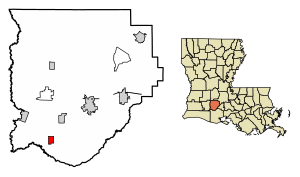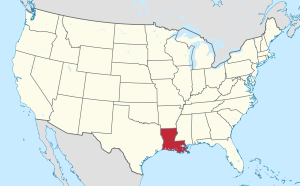Morse, Louisiana facts for kids
Quick facts for kids
Morse, Louisiana
|
|
|---|---|
|
Village
|
|

Location of Morse in Acadia Parish, Louisiana.
|
|

Location of Louisiana in the United States
|
|
| Country | United States |
| State | Louisiana |
| Parish | Acadia |
| Incorporated | 1906 |
| Area | |
| • Total | 1.40 sq mi (3.63 km2) |
| • Land | 1.40 sq mi (3.63 km2) |
| • Water | 0.00 sq mi (0.00 km2) |
| Elevation | 10 ft (3 m) |
| Population
(2020)
|
|
| • Total | 599 |
| • Density | 427.55/sq mi (165.10/km2) |
| Time zone | UTC-6 (CST) |
| • Summer (DST) | UTC-5 (CDT) |
| Area code(s) | 337 |
| FIPS code | 22-52320 |
Morse is a small village in Acadia Parish, Louisiana, United States. In 2020, about 599 people lived there. It is part of the larger Crowley area.
The village of Morse was first planned in 1898 on land owned by J. M. Crabtree. Farmers from Illinois and Iowa were some of the first people to settle here. Morse became an official village in 1906. The Southern Pacific Railroad built a train line through this area in 1895. They named the stop "Morse Station" after Colonel Samuel Finley Breese Morse. He was a passenger agent for the railroad in New Orleans and a cousin of the famous inventor of the telegraph. Colonel Morse helped encourage people to move to this area.
Exploring Morse, Louisiana
Where is Morse Located?
Morse is located in the state of Louisiana. Its exact coordinates are 30.121628 degrees North and 92.498500 degrees West.
The United States Census Bureau says that the village covers a total area of about 3.6 square kilometers (or 1.4 square miles). All of this area is land, with no water.
How Many People Live in Morse?
| Historical population | |||
|---|---|---|---|
| Census | Pop. | %± | |
| 1910 | 237 | — | |
| 1920 | 482 | 103.4% | |
| 1930 | 549 | 13.9% | |
| 1940 | 742 | 35.2% | |
| 1950 | 679 | −8.5% | |
| 1960 | 682 | 0.4% | |
| 1970 | 759 | 11.3% | |
| 1980 | 835 | 10.0% | |
| 1990 | 782 | −6.3% | |
| 2000 | 759 | −2.9% | |
| 2010 | 812 | 7.0% | |
| 2020 | 599 | −26.2% | |
| U.S. Decennial Census | |||
The population of Morse has changed over the years. Here's a look at how many people lived there during different census years:
- In 1910, there were 237 people.
- By 1940, the population grew to 742 people.
- In 2010, the village had 812 residents.
- The most recent count in 2020 showed 599 people living in Morse.
In 2000, there were 759 people living in the village. About 40.5% of the households had children under 18. The average household had about 2.72 people. The median age in the village was 32 years old. This means half the people were younger than 32 and half were older.
The average income for a household in Morse in 2000 was about $24,922 per year. For families, the average income was around $28,750. About 22.9% of the population lived below the poverty line.
See also
 In Spanish: Morse (Luisiana) para niños
In Spanish: Morse (Luisiana) para niños
 | Laphonza Butler |
 | Daisy Bates |
 | Elizabeth Piper Ensley |

